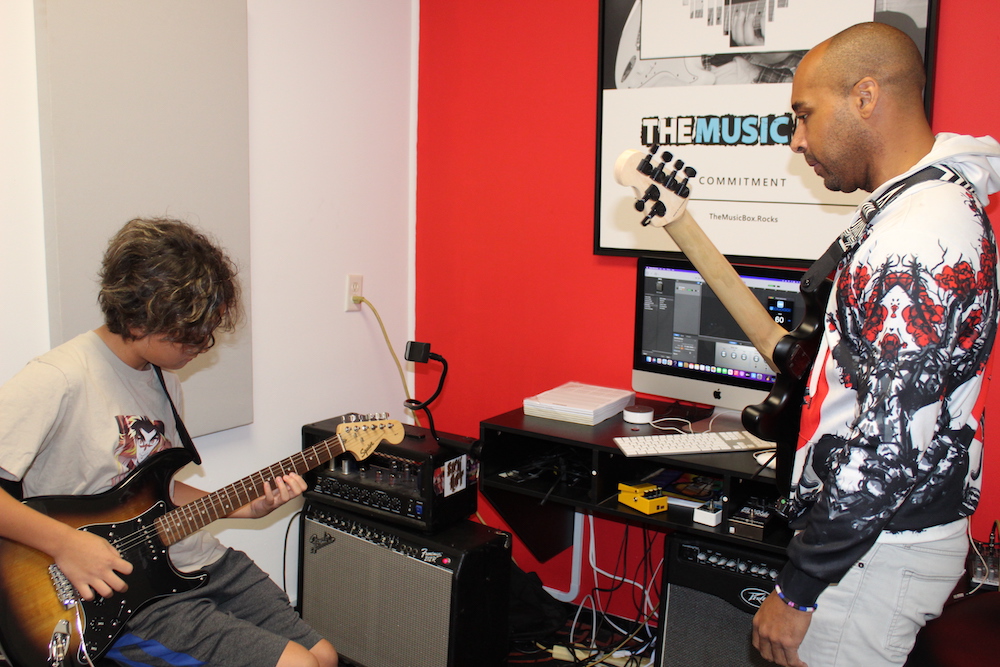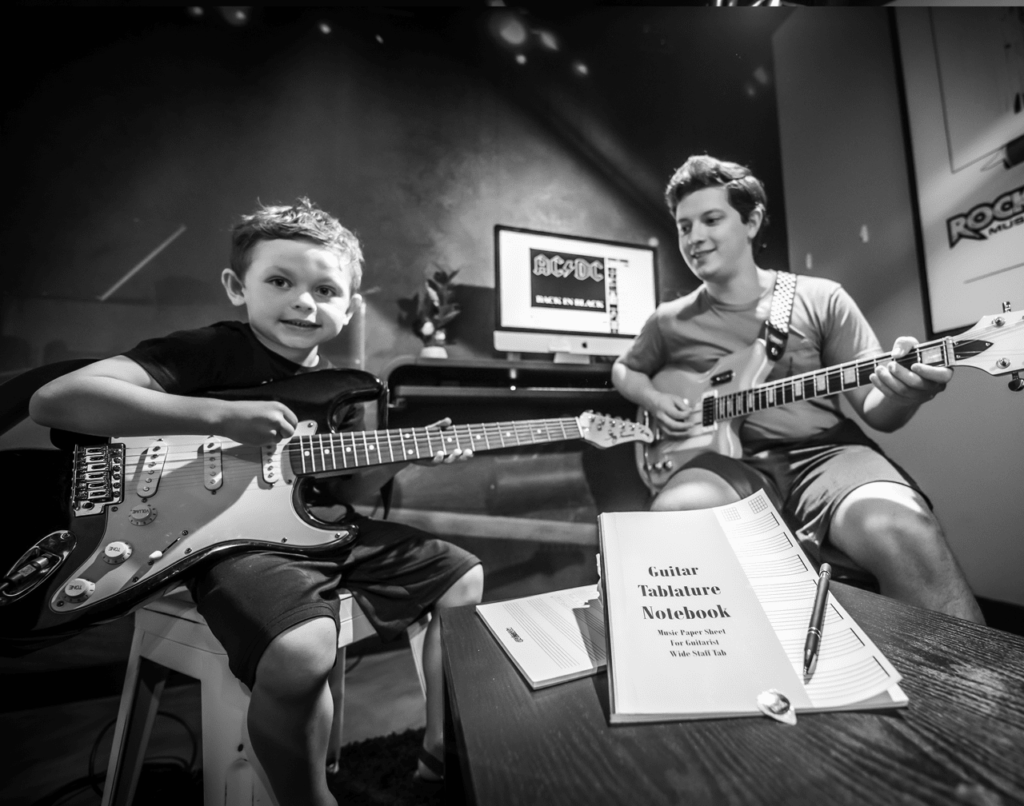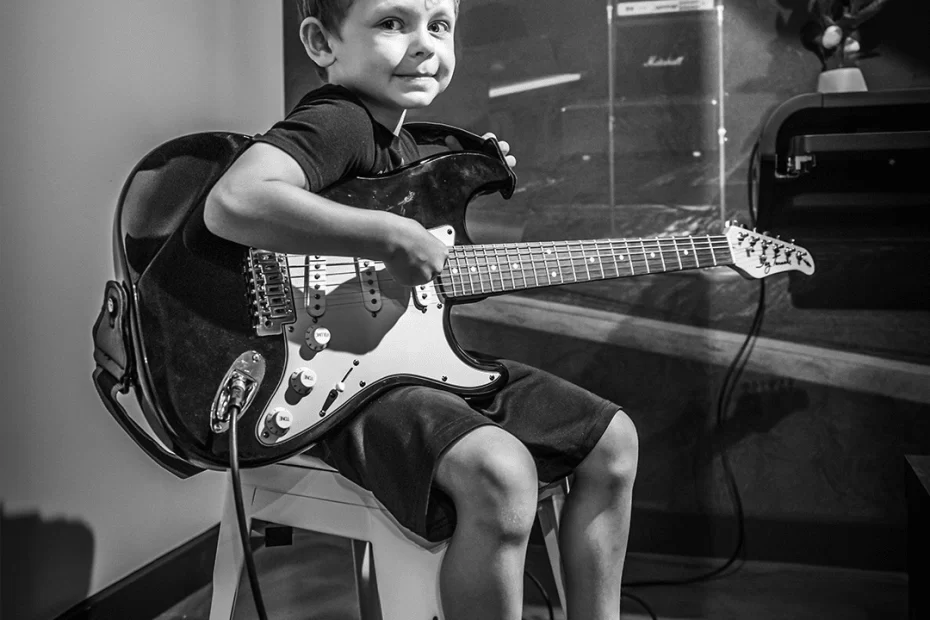The terms “kid guitars” and “normal guitars” are extremely oversimplified. Many people sell guitars they know next to nothing about, and they liberally attach “kid-sized” next to any instrument that isn’t full-sized per se.
We are Tampa’s premier music school called The Music Box. Besides offering exemplary guitar, bass, drums, and vocal lessons, we also strive to offer helpful advice to beginners who probably can’t tell the difference between normal and smaller instruments.
In essence, the size of the guitar affects many important elements of its performance. Children of different ages can benefit the most from the smallest guitar types, as well as people with smaller hands and recreational players who only want to learn how to play a few chords.
Today, our guitar coaches will break down everything you need to know about a guitar’s scale length, the most popular guitar sizes, and how to pick your first guitar.
What is Scale Length?
Stringed instruments do not effectively use the entire length of their strings. For example, it’s normal for regular Telecaster guitars to be long enough to support strings as tall as 27-28 inches. However, only 25.5-26 inches of these strings will vibrate and thus produce a tone.
The remaining few inches are too tense to vibrate. These “silent” parts are right above the nut slot and near the guitar’s saddle. If you want to learn more about guitar scale lengths, swing by our Instagram page and check out our videos.
The main reason why understanding scale length is important is that many vendors will advertise their guitars through their scale lengths rather than actual height. If, for example, you went on Amazon or eBay to look for guitars, you’ll mainly see their scale lengths in the title rather than their actual dimensions.
Why Is Understanding Scale Length Important?
The size of the guitar is tightly related to its scale length. Obviously, the longer the instrument is, the longer its scale length will be too.
A guitar’s scale length affects its fret spacing, string tension, playability, and even tone. On longer scale lengths, the frets are usually wider, the strings are tense, and they’re objectively somewhat harder to play.

Guitar Sizes Explained
As we mentioned, the size of the guitar is linked to its scale length, but they are two completely different terms.
When looking for different guitar sizes, you’ll usually see titles like “¼ Guitar”, “½ Guitar”, “¾ Guitar”, and “Full Size Guitar”. For reference, the smallest “quarter guitars” are meant for toddlers and kids up to five years old while full-size guitars are typically used by adults.
We have all kinds of guitars at The Music Box, and if you want to see how they sound in real life, check us out on our Facebook page.
Kid-Sized Guitars: 1/4, 1/2, and 3/4 Guitars
Guitars for children are much smaller than full-sized guitars, and each type is meant to be used by kids of different age groups.
The smallest of the bunch is the 1/4 Guitar size. They are typically 30 inches tall and are meant for kids 2-5 years old. Half-size guitars are just 3 inches taller and are often used by kids who attend music pre-schools (5-8 years old). Three-quarter size guitars are usually 36 inches tall and are often used by music school students until they reach high school (roughly until their teenage years).
Full-Size Guitars Types and Sizes
There are dozens of different types of full-size guitars. These instruments are not only differentiated by their length but also by their weight, body size, fret size, sound, and several other elements.
Among dozens of guitar sizes, nine are popular enough to be considered mainstream, including the Parlor, Concert, Grand Concert, Auditorium, Grand Auditorium, Grand Symphony, Dreadnought, Grand Orchestra, and Jumbo.
Parlor guitars are the smallest and are comparable to 3/4-size guitars. Lightweight, portable, and somewhat louder than their semi-size counterparts, they are very popular among beginners. Fresh guitar students love Grand Concert guitars for the same reasons, although GCs are somewhat louder and taller.
Auditorium and Dreadnought guitars have very similar dimensions and are often differentiated by cutaways and tone. They’re ideal for more experienced students who can handle a normal-sized guitar.
Jumbo and Grand Auditorium guitars have low-focused, bellowing tones and are the largest of the bunch.

Electric Guitar Sizes
Electric guitars come in pretty much all shapes and sizes as acoustic guitars. However, there is one major difference – top brands in the industry are currently focused on pushing guitars with more and more strings (7+). As opposed to “larger and smaller” guitar sizes, we’re now seeing “wider and narrower” fretboards because of this.
We should also mention that 7-string guitars, 5-string basses, and instruments that have more strings than usual are not exclusive to more experienced players. Even though they’re somewhat bulkier and larger than average, guitars with 7 or more strings are now becoming more popular among beginners too.
Learning How to Play Guitar at The Music Box
Now that you know how to pick the right guitar, you’re probably wondering where you can polish your skills and learn new techniques. That’s where we come into play.
Welcome to The Music Box, Tampa’s premier guitar school. We offer professional guitar coaching services to teens, adults, parents, and even children aged 4 and older. If you always wanted to learn how to play guitar or want your child to receive the best education and grow in a friendly, action-packed environment, we’ll be more than happy to have you.
Enrolling in The Music Box
We’re headquartered in Carrollwood, Florida at 4321 Gunn Highway, so feel free to swing by if you want to learn more. You can also enroll online by following this link. Our guitar coaches boast decades of experience, and our classrooms are outfitted with cutting-edge musical equipment, so whenever you’re ready to jump in with both feet, we’d be glad to help you in your music-learning journey



